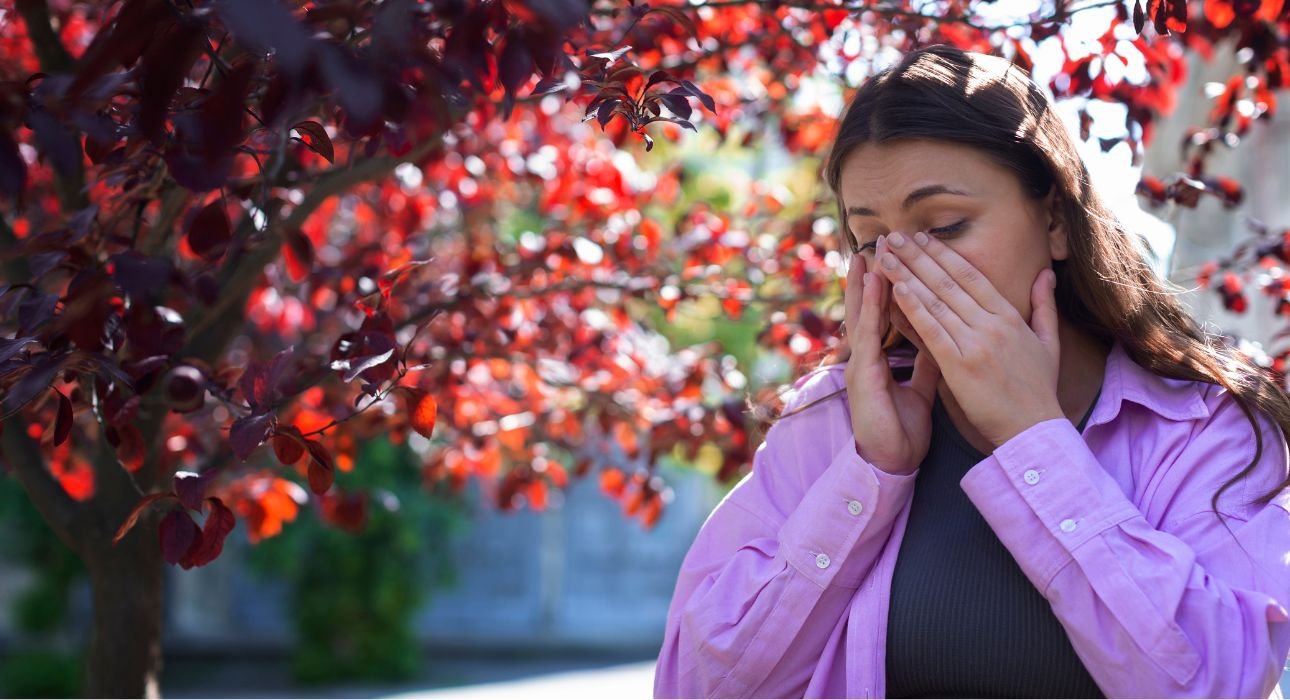For many people, allergies are an annoying yet tolerable inconvenience, something you take some medicine for once or twice a year and move on. But for others, including those with chronic allergic conditions like allergic rhinitis, sneezing and congestion may be the least of the problems. They can spill over into emotional health, impacting mood, energy and sleep and even feeding into anxiety.
New research suggests allergies and anxiety may be linked, and that the presence of one may cause the onset of the other, or make the other worse. Here, we explore how immune dysregulation and difficulty breathing may affect mental health, and how holistic care for allergies could boost resilience in the mind.
The Silent Role Played by Allergies in Mental Health
AR affects up to 40% of children and 30% of adults worldwide. Though it is commonly perceived as a minor affliction, its symptoms clog up the sinuses, causing nasal congestion, postnasal drip, itchy eyes and fatigue, to those who suffer it can become chronic and disruptive. For others, these physical complaints lead to emotional distress, especially when it disrupts sleep, productivity, and friendships.
Yet outside of the lifestyle indignities (snoring, snot-nosed selfies) they foist upon us, there’s an increasing amount of evidence that allergies are associated with higher rates of mood disorders and anxiety.
Numerous researches have demonstrated that in comparison with (non-allergic) controls, individuals with AR experience significantly higher prevalence of GAD, depression and sleep disturbance. Allergic rhinitis was associated with increased risk of mental health issues, including depression, anxiety, suicidal attempts and thoughts compared to control.
How Allergies May Contribute to Anxiety: The Biological Connection
So what’s going on beneath the surface? Researchers propose several mechanisms that may explain the allergy–anxiety connection:
1. Chronic Inflammation and Brain Chemistry
The immune response is initiated by allergic responses that secrete pro-inflammatory cytokines, including IL-6 and TNF-α. But these molecules do much more than simply trigger runny noses and congestion. They can also affect brain health. Cytokine disbalances have been related to disturbances in serotonine and dopamine, the neurotransmitters most strongly associated with mood control. Chronic inflammation in the brain even has been associated with greater risk of developing anxiety and depression.
2. Respiratory Stress and Hyperarousal
When, especially at night, your airways are inflamed or obstructed, your breathing becomes more shallow and erratic. This may trigger the sympathetic nervous system, which parallels the biological stress in anxiety disorders. Untreated AR commonly disrupts sleep and raises nocturnal waking, which are related to emotional regulation deficiencies.
3. Brain Fog, Fatigue, and Emotional Drain
Cognitive distress, such as inability to focus, sluggish thinking, and lack of energy — commonly referred to as “allergy brain fog” — may diminish coping resources and exacerbate anxiety symptoms, especially in challenging environments such as work or school. Allergic fatigue is a real, underdiagnosed cause of daytime dysfunction.
When Allergy Symptoms Masquerade as Mental Health Issues
“With one so closely overlapping the symptoms of the other, you can easily misattribute symptoms. For example:
A kid with bad nasal allergies can look hyperactive or at least restless from lack of sleep, which can be mistaken for ADHD.
A post-nasal drip adult who is constantly clearing his throat may have social anxiety or avoidance.
A person who has chronic fatigue due to uncontrolled allergies might seem emotionally flat or irritable, similar to low-level depression.
This suggests the importance of mental health practitioners taking into account physical health, and specifically, respiratory and immunity problems when treating individuals presenting with anxiety-like symptoms.
Treatment: Why Addressing Allergies Can Improve Mental Health
The good news? Clearing up allergies can help not only physical symptoms, but also restore better sleep, reduce inflammation and lower overall stress reactivity — all of which promote emotional well-being. When I first deal with the symptoms of SIBO (Small Intestinal Bacterial Overgrowth), people typically start with Symptom-based relief like:
- Antihistamines
- Nasal corticosteroids
- Decongestants
- Eye drops or inhalers
A lot of these treatments are available over the counter in drug and grocery stores. If you’re uncertain as to which one would best fit your needs, consult with your primary health care provider. And though these remedies work in the short term, they won’t treat the underlying immune sensitivity that leads to allergies.
What About Long-Term Solutions?
For people with persistent or severe allergic symptoms, especially those also managing anxiety or fatigue, allergy immunotherapy may offer more lasting benefits. This includes:
- Sublingual immunotherapy (oral drops or tablets taken at home). This is a great option for needle-phobic adults and children. You can take it at home after the first dose, whenever it’s most convenient for your schedule.
- Allergy shots (in-office injections delivered over the years): Adults are most likely to choose this treatment option. It needs weekly doctor visits for shots, ultimately reduce to monthly shot visits.
Both treatments work by training the immune system to grow less and less reactive over time. Allergy shots or sublingual (under the tongue) treatments can alleviate symptoms, enable a better night’s sleep and even lessen the need for daily medication, which could result in a better mood and clearer thinking, according to the American College of Allergy, Asthma & Immunology (ACAAI).
A Mind-Body Approach to Care
The link between allergic reactions and anxiety is a clear example of the fact that our bodies and our minds are not separate entities. Chronic immune activation is not simply something that happens in your nose. It influences how well you sleep, how good or bad your mood is, how much energy you have and how able you are to handle stress. If you or a loved one happens to be challenged by allergies and anxiety at the same time, perhaps proactively share both sides of that coin with your care team. When we treat the immune system and the nervous system as one and the same, we have an opportunity to foster resilient, sustainable health.
